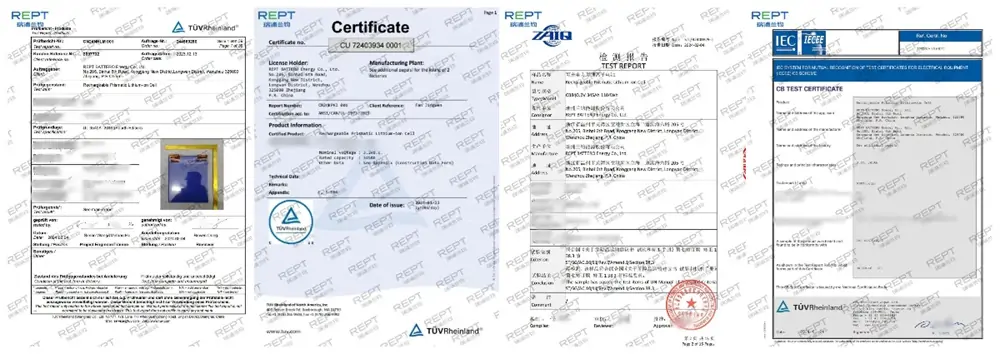 |
Welcome To Evlithium Best Store For Lithium Iron Phosphate (LiFePO4) Battery |
 |
Recently, REPT's 345Ah energy storage battery cell, manufactured by Wending, has successfully obtained three international authoritative certifications from TÜV Rheinland in Germany. These certifications include UL1973, UL9540A, and IEC62619, demonstrating that the safety performance of the 345Ah energy storage battery cell meets international standards. Additionally, it has also received UN38.3 certification, marking its compliance with mandatory safety transport standards. This achievement signifies that the Wending 345Ah energy storage battery cell has obtained the passport for international market access.
The Wending 345Ah energy storage battery cell represents the next generation of REPT's energy storage series. It incorporates innovative technologies in cell structure, process, equipment, and electrochemical solid-liquid interface, among other core advancements. Despite sharing the same external dimensions as the existing 280Ah cells, the volume energy density of the 345Ah cell has increased significantly from 357Wh/L to 440Wh/L, reaching an industry-leading level.

High-capacity cells with advantages in safety, longevity, and cost are experiencing vibrant growth in the energy storage market. The substantial improvement in volume energy density achieved by the Wending 345Ah energy storage battery cell within the same size contributes to space savings in system integration, leading to cost reduction and increased efficiency. As global attention continues to rise towards renewable energy and energy storage systems, the Wending 345Ah energy storage battery cell, holding international standard certifications, is set to achieve comprehensive production and global promotion in 2024, further enhancing the global influence of China's energy storage industry.
UL1973 is a safety standard for energy storage battery systems in North America, recognized by both the American ANSI and the Canadian SCC. It is also acknowledged by other regions such as the Australian CEC, allowing products certified under this standard to enter North American and Australian markets seamlessly.
UL9540A, one of the most authoritative and stringent testing standards for thermal runaway and flame propagation in battery energy storage systems globally, is a crucial means to verify the safety of energy storage products. It is widely accepted by entities such as the U.S. National Fire Protection Association, federal agencies, and energy storage associations worldwide, serving as an essential passport for entering North American and global markets.
IEC62619, part of the IEC standard system specifically formulated for batteries used in industrial equipment, is the current international technical standard covering safety requirements for energy storage batteries.
UN38.3, a United Nations standard for the transport of dangerous goods, is a mandatory test to ensure the safe transportation of lithium batteries by air, sea, and land. It is a widely accepted international standard for safe transport technology.
Edit by editor
All Rights reserved © 2025 Evlithium Limited